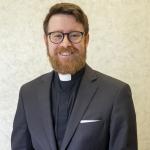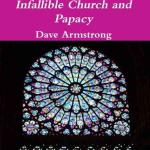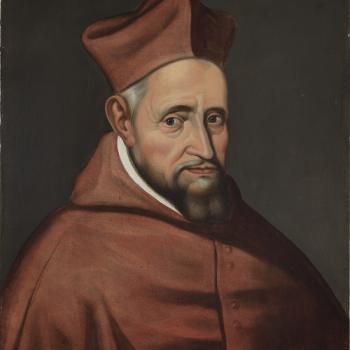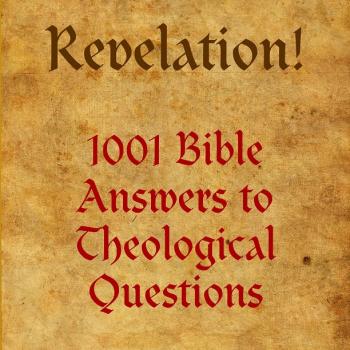Contra John Martignoni’s Repeated Claims to the Contrary
Catholic apologist John Martignoni has stated no less than seven times in public (in his newsletter, which he told me has 70,000 subscribers, and on his website) that I classified Bishop Strickland and/or Cardinal Burke as “heretics” or called them that term or thought it (line breaks represent a break in the text):
. . . essentially accusing Bp. Strickland of being a heretic . . .
So, here was Dave Armstrong essentially calling Bp. Strickland, and Cardinal Burke, a couple of heretics.
There is no need for all the public rancor and the public attacks and calling people reactionaries and heretics and the like. Does absolutely no good.
. . . there is absolutely no reason to call Bp. Strickland a heretic, or to even strongly imply it. (“Apologetics for the Masses #466 – Pope Francis, Bp. Strickland, Papal Indefectibility, and…Dave Armstrong”)
Okay, so why am I saying that Armstrong appears to be misunderstanding the Church’s teaching on Papal Indefectibility (and/or Papal Infallibility) based on his FB posts that I’ve quoted above? It’s because he is disagreeing with Cdl. Burke’s tweet. Again, Cdl. Burke said the following: “If your bishop, or the supreme pastor of the Church, is affirming things not in accord with Sacred Tradition/the deposit of the faith, that can’t command your obedience. You can’t command obedience to do something against faith & morals.” Armstrong disagrees with that. In fact, he disagrees with that so strongly that he is, for all intents and purposes, saying anyone who agrees with that statement is rejecting the Church’s dogmatic teaching on the Pope. I.e., that person is a heretic.
That’s where he started begging off about the questions being too complex, and matters of canon law, and that he defers to others who are more qualified in such matters. Well, if you aren’t qualified enough to answer these questions, then how can you be qualified enough to essentially deem Bp. Strickland and Cdl. Burke to be heretics who deny Papal Indefectibility and the authority of the Pope?!
So, Dave is, essentially, accusing Bp. Strickland and Cdl. Burke of heresy…of rejecting Papal Indefectibility. (“Apologetics for the Masses #469 – Pope Francis, Bp. Strickland, Papal Indefectibility, and…Dave Armstrong (Part 4)”; see also Part 2 and Part 3 of the ongoing soap opera)
In fact, I did no such thing. One can consult my Facebook thread where this disagreement began, or a second part, or a third, and the words “heresy” or “heretic” never appear at all (from me) in them, let alone as applied to either of these two men. I never made the claim. I have exactly two articles about Bp. Strickland on my blog:
Tragic Bp. Strickland & Reaction from the Usual Suspects [11-14-23]
Bishop Strickland: The Writing Was on the Wall [Catholic365, 11-16-23]
To the best of my recollection, I had never written about him prior to this time (I scarcely even knew who he was). In the article above dated 11-14-23, the word “heresy” appears once, and it’s describing Strickland’s view of the pope (not mine of him). I cited Mike Lewis writing, “He also signed an open letter [dated 9-16-22] last year accusing Pope Francis of teaching heresy“. In the second, which Martignoni has cited as evidence of his mythical belief in alleged claims that I made, the words “heresy” or “heretic” never appear at all. It’s pretty difficult and foolish to claim that someone classified another as a heretic, when they never even used the word.
Martignoni contends that the following statement of mine on my Facebook page (the title of the post and thread where this tempest in a teapot began) proves that I classified Strickland as a heretic:
What is the difference between Bishop Strickland and Martin Luther? The first claims to acknowledge papal authority but then rejects it at his convenience; the second is honest and not conflicted about rejecting papal authority.
One can make an analogy without intending (nor is it logically necessary to conclude) that the two things or persons being compared are absolutely the same in all respects. My (I think, obvious) point was that one man was consistent with regard to popes and the other was not. One rejected papal authority altogether (as a Protestant); the second only did inconsistently, as a Catholic who ought to obey papal authority. That was my point. It wasn’t a point about papal infallibility or indefectibility, but about papal authority: a much broader area. “Say what you mean and mean what you say.” That’s what I always try to do. It was a million miles away from claiming that the Catholic man is a heretic, as Luther was, because one can disobey papal authority in several ways without being a heretic (some might involve, for example, schism rather than heresy).
If I thought Bp. Strickland was a heretic, I certainly would have called him one. Pretty much anyone, I think, who has read much of my writing at all knows that I am not the type who minces words or is reluctant to express even a “controversial” opinion. I try to be charitable at all times, but that’s a different thing from being straightforward or a “straight shooter.” I am those things, too. James wrote “let your yes be yes and your no be no” (Jas 5:12). Good traits for an apologist and for all Christians!
Martignoni’s strongest statement on the topic is “he is [yours truly!], for all intents and purposes, saying anyone who agrees with that statement is rejecting the Church’s dogmatic teaching on the Pope. I.e., that person is a heretic.” Here he is claiming that I have classified papal indefectibility as a dogma. But in my article at Catholic365 (linked above, and that he presumably read, since he mentioned it), I specifically differentiated the two teachings on the pope and error:
. . . the doctrine of papal indefectibility, which was proclaimed at Vatican I (One) in 1870, at the same time it decreed papal infallibility as a de fide dogma.
Catholic dogmatic theologian Robert Fastiggi (translator and editor of the latest 2012 edition of Denzinger’s Enchiridion: the standard source for determining what the Church teaches) — and a personal friend of mine — has again helpfully clarified the issue of papal indefectibility, in a piece that will shortly be hosted and posted on my own blog. He wrote about this question:
I never claimed that Vatican I defined the indefectibility of the Roman Pontiff. I believe, though, that it affirms this teaching in Pastor Aeternus, chapter IV, when it teaches that “in the Apostolic See the Catholic religion has always been preserved immaculate and sacred doctrine honored” (Denz.-H, 3066). In the same chapter of Vatican I, it is likewise stated that “this See of St. Peter always remains untainted by any error, according to the divine promise of our Lord and Savior made to the prince of the disciples: ‘But I have prayed for you that your faith may not fail; and when you have turned again, strengthen your brethren’ (Lk 22:32)” [Denz.-H. 3070]. The possibility of a heretical pope is likewise rejected by Vatican I, when it affirms that the “charism of truth and never-failing faith was conferred upon Peter and his successors in this chair in order that they may perform their supreme office for the salvation of all” [Denz.-H, 3071]. (emphasis added).
What seemed true to Suárez and Bellarmine has been affirmed by an ecumenical council. How can these words of Vatican I be reconciled with a Pope teaching heresy? Some claim the pope is protected from heresy only when he teaches ex cathedra. But this is not what Vatican I says. . . . Heresy is the denial or calling into doubt a truth that must be believed with divine and Catholic faith. . . . I do agree that we need to give a benevolent interpretation of what Bishop Strickland and Cardinal Burke have said. They seem to assume that a pope can teach heresy. Well, that is their opinion, and their opinion is not infallible, and I argue that their opinion is not that of Vatican I. Unfortunately, the affirmation of papal indefectibility and the divine protection of popes from teaching heresy does seem to not be adequately understood today. . . . The simple fact remains that the Magisterium has never affirmed that popes can teach heresy, and the letter of Pope Agatho and Vatican I seem to rule out that possibility.
Any truth taught by the Church as necessary for acceptance by the faithful. The truth may be either formally revealed (as the Real Presence), or a theological conclusion (as the canonization of a saint), or part of the natural law (as the sinfulness of contraception). In any case, what makes it doctrine is that the Church authority teaches that it is to be believed. This teaching may be done either solemnly in ex cathedra pronouncements or ordinarily in the perennial exercise of the Church’s magisterium or teaching authority.
An ecumenical council, ratified by the pope, is certainly “the Church’s magisterium or teaching authority.” In fact it is the extraordinary magisterium. Vatican I teaches papal indefectibility. It’s just not at the highest level of authority (ex cathedra or de fide dogma). Nonetheless, it is to be adhered to by Catholics, as an official teaching of the magisterium (which has never taught otherwise, if we accept Dr. Fastiggi’s word on that). This is according to Canon 752 in the Code of Canon Law:
Although not an assent of faith, a religious submission of the intellect and will must be given to a doctrine which the Supreme Pontiff or the college of bishops declares concerning faith or morals when they exercise the authentic magisterium, even if they do not intend to proclaim it by definitive act; therefore, the Christian faithful are to take care to avoid those things which do not agree with it.
This is why radical Catholic reactionaries (especially Peter Kwasniewski and the folks at the website One Peter Five) are at present trying to delegitimize the authority of Vatican I, precisely because they don’t like its teachings on papal infallibility and indefectibility (yet they are required to give the latter “a religious submission of the intellect and will”). Dogmas are on a higher level still. Here is Fr. Hardon’s definition:
Doctrine taught by the Church to be believed by all the faithful as part of divine revelation. All dogmas, therefore, are formally revealed truths and promulgated as such by the Church. they are revealed either in Scripture or tradition, either explicitly (as the Incarnation) or implicitly (as the Assumption). Moreover, their acceptance by the faithful must be proposed as necessary for salvation. They may be taught by the Church in a solemn manner, as with the definition of the Immaculate Conception, or in an ordinary way, as with the constant teaching on the malice of taking innocent human life. (pp. 168-169)
This distinction has a relation to what it means to be classified as a “heretic.” It specifically has to do with rejection of dogmas. Fr. Hardon defines “heresy”:
In the Roman Catholic Church, heresy has a very specific meaning. Anyone who, after receiving baptism, while remaining nominally a Christian, pertinaciously denies or doubts any of the truths that must be believed with divine and Catholic faith is considered a heretic. Accordingly four elements must be verified to constitute formal heresy; previous valid baptism, which need not have been in the Catholic Church; external profession of still being a Christian, otherwise a person becomes an apostate; outright denial or positive doubt regarding a truth that the Catholic Church has actually proposed as revealed by God; and the disbelief must be morally culpable, where a nominal Christian refuses to accept what he knows is a doctrinal imperative.
Objectively, therefore, to become a heretic in the strict canonical sense and be excommunicated from the faithful, one must deny or question a truth that is taught not merely on the authority of the Church but on the word of God revealed in the Scriptures or sacred tradition. Subjectively a person must recognize his obligation to believe. If he acts in good faith, as with most persons brought up in non-Catholic surroundings, the heresy is only material and implies neither guilt nor sin against faith. (p. 247)
Likewise, Canon 751 in Book III of the Code of Canon Law: “Heresy is the obstinate denial or obstinate doubt after the reception of baptism of some truth which is to be believed by divine and Catholic faith . . .” I simply have not accused either Bp. Strickland or Cdl. Burke of being heretics. Moreover, I have written very critically of the group that I have myself coined “radical Catholic reactionaries,” but am very careful not to call them even schismatics. I always try to be very meticulous and consistent in these matters of proper terminology. I will usually use the term “quasi-schismatics.” That is, ones who are arguably getting dangerously close to schism, but have not yet crossed that canonical line. So, for example, here is a typical broad statement from a past article of mine concerning Catholic reactionaries:
I define “radical Catholic reactionaries” as a rigorist, divisive group completely separate from mainstream “traditionalism” that continually, vociferously, and vitriolically (as a marked characteristic or defining trait) bashes and trashes popes, Vatican II, the New Mass, and ecumenism (the “big four”): going as far as they can go without technically crossing over the canonical line of schism.
In other words, I don’t even call those on the right side of the ecclesiastical spectrum (ones who call themselves — rightly or wrongly — Catholic traditionalists) “schismatics” let alone “heretics.” Anyone who has followed my writings about them, which have been published for over 25 years (including two books on the topic) knows that.
A Google Advanced Search of my blog for the word “heretic” reveals how rarely and specifically I use the term. I have used it, for example, with regard to Eastern Patriarchs in the early centuries who were guilty of serious Christological errors such as Arianism, Monophysitism, or Monothelitism, and for the “pantheist heretic” Michael Servetus. I rarely use it of any living person, except for maybe Mormons or Jehovah’s Witnesses, because of their denial of the Holy Trinity. It’s simply not the way that I talk, and it’s ludicrous for anyone to imply that it is, or to make the charge that I allegedly applied the term to Strickland or Burke.
If John Martignoni continues with this misguided accusation he will only harm himself and his readers. The ones freely slinging the word “heretic” around are the vitriolic critics of the pope, not myself. Projecting their tragically mistaken mentality onto me doesn’t solve anything. Even Catholic philosopher Ed Feser, no big friend of the pope, wrote on his blog on 3-5-24: “No one has succeeded in showing that Pope Francis is a formal heretic.”
***
See the related articles:
Papal Indefectibility: Dr. Fastiggi vs. Fr. Z [3-11-21]
*
***
*
Practical Matters: Perhaps some of my 4,500+ free online articles (the most comprehensive “one-stop” Catholic apologetics site) or fifty-five books have helped you (by God’s grace) to decide to become Catholic or to return to the Church, or better understand some doctrines and why we believe them.
Or you may believe my work is worthy to support for the purpose of apologetics and evangelism in general. If so, please seriously consider a much-needed financial contribution. I’m always in need of more funds: especially monthly support. “The laborer is worthy of his wages” (1 Tim 5:18, NKJV). 1 December 2021 was my 20th anniversary as a full-time Catholic apologist, and February 2022 marked the 25th anniversary of my blog.
PayPal donations are the easiest: just send to my email address: [email protected]. Here’s also a second page to get to PayPal. You’ll see the term “Catholic Used Book Service”, which is my old side-business. To learn about the different methods of contributing (including Zelle), see my page: About Catholic Apologist Dave Armstrong / Donation Information. Thanks a million from the bottom of my heart!
*
***
Photo credit: Image by rarenux [Deviant Art / Creative Commons Attribution-Noncommercial 3.0 License]
Summary: Catholic apologist John Martignoni insists that I regard Bp. Strickland & Cdl. Burke as “heretics.” This is patently, utterly false & I provide several reasons for why it is.













